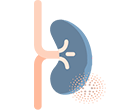Nephrotic Syndrome Precision Panel
Nephrotic Syndrome (NS) is defined as the presence of nephrotic-range proteinuria with a low serum albumin level, edema and hypercholesterolemia, indicating damage to the glomerular filtration barrier.


The clinical utility of this panel is:
Shin, J. I., Kronbichler, A., Oh, J., & Meijers, B. (2018). Nephrotic Syndrome: Genetics, Mechanism, and Therapies. BioMed research international, 2018, 6215946. https://doi.org/10.1155/2018/6215946
Rood, I., Deegens, J., Lugtenberg, D., Bongers, E., & Wetzels, J. (2019). Nephrotic Syndrome With Mutations in NPHS2: The Role of R229Q and Implications for Genetic Counseling. American Journal Of Kidney Diseases, 73(3), 400-403. doi: 10.1053/j.ajkd.2018.06.034
Sharief, S. N., Hefni, N. A., Alzahrani, W. A., Nazer, I. I., Bayazeed, M. A., Alhasan, K. A., Safdar, O. Y., El-Desoky, S. M., & Kari, J. A. (2019). Genetics of congenital and infantile nephrotic syndrome. World journal of pediatrics : WJP, 15(2), 198–203. https://doi.org/10.1007/s12519-018-00224-0
Watanabe, A., Feltran, L. S., & Sampson, M. G. (2019). Genetics of Nephrotic Syndrome Presenting in Childhood: Core Curriculum 2019. American journal of kidney diseases : the official journal of the National Kidney Foundation, 74(4), 549–557. https://doi.org/10.1053/j.ajkd.2019.01.033
Eddy, A. A., & Symons, J. M. (2003). Nephrotic syndrome in childhood. Lancet (London, England), 362(9384), 629–639. https://doi.org/10.1016/S0140-6736(03)14184-0
Braun, D. A., Rao, J., Mollet, G., Schapiro, D., Daugeron, M. C., Tan, W., Gribouval, O., Boyer, O., Revy, P., Jobst-Schwan, T., Schmidt, J. M., Lawson, J. A., Schanze, D., Ashraf, S., Ullmann, J., Hoogstraten, C. A., Boddaert, N., Collinet, B., Martin, G., Liger, D., … Hildebrandt, F. (2017). Mutations in KEOPS-complex genes cause nephrotic syndrome with primary microcephaly. Nature genetics, 49(10), 1529–1538. https://doi.org/10.1038/ng.3933